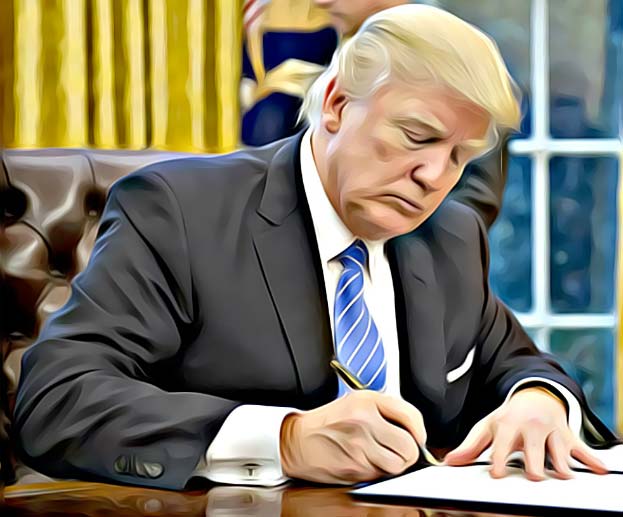
Opinions of the One Big Beautiful Bill tend toward the extreme. One of its main authors calls it "the greatest piece of Republican legislation in a generation,” while one of its most authoritative critics says it makes him ashamed to be an American. So allow me to offer what counts as a radical view: The bill is neither as terrible as its opponents say nor as impressive as its supporters claim.
The reason markets are not responding more to the 870-page bill is that they see it for what it is — just another in a very long line of very big bills that add to the debt but won't break the economy, at least not soon.
Such bills always contain some good stuff and some bad stuff. Some of the better provisions of this bill make permanent the beneficial aspects of Tax Cut and Jobs Act of 2017. The increased standard deduction, for example, makes the tax code less distortionary. Allowing full expensing for corporate research and investment will increase growth.
The bill also keeps the lower rates from the 2017 law, which accounts for a lot of its multitrillion-dollar cost. That's something America can't really afford — but it doesn't need a sudden $4.5 trillion tax increase that hits the middle class, either. When the US increases taxes, there are better ways to do it.
One of the more controversial aspects of the bill is its cuts to Medicaid in the form of work requirements for able-bodied, working-age adults who aren't caregivers. The
At any rate, it's clear that Medicaid needs reform. Its costs have been growing over the decades, even compared to other entitlements, as states enroll more people and pay more for services. The design of the program, in which the federal government pays most of the costs and the states provide the care, invites waste and inefficiency: States tax hospitals and nursing homes, and then claim more federal funding to finance the higher cost of care the tax imposes. This bill takes a step in the direction of reform and prevents states from charging higher hospital taxes.
Of course, there's bad stuff in the bill, too. Eliminating taxes on interest payments for car loans, increasing the SALT cap, and raising the exemption for estate taxes is regressive and expensive. It's also hard to justify not taxing tips or overtime pay.
Still, for most Americans, their taxes and health insurance will remain unchanged. If Americans bear any cost in the near term, it will be in the form of higher interest rates from increased debt levels. And it is hard to pin that on this bill alone, given the nonstop spending bonanza the government has been on since the pandemic.
The main problem with this bill is it was a missed opportunity to take on the government's growing debt crisis. America needs major reform to both broaden the tax base and simplify the tax code. It also needs more entitlement reform — not just Medicaid, but
To be fair, President
(COMMENT, BELOW)
Allison Schrager, a Bloomberg columnist, is a senior fellow at the Manhattan Institute and a contributing editor of City Journal.
Previously:
• America's broken politics is breaking economics, too
• A college degree is no longer a risk-free investment
• Break up Columbia? Maybe, and the rest of the Ivy League, too
• Even Dems might like MAGA accounts
• Reality Check about possibile volatility in trade war
• Is this really how American exceptionalism ends?
• The free-market conservative is a vanishing breed
• Shareholder capitalism is back
• Europe's risk aversion comes with consequences
• The Oxford curriculum that American universities need
• Private equity won't diversify your portfolio
• The era of declining interest rates may have come to an end, and many investors don't seem to realize it
• This one weird trick could save the U.S. economy
• The Fed's damage to the housing market may last years
• The future of unions looks very different
• To bring back the office, bring back lunch
• Does it really matter who gets into Harvard?
• Our pensions shouldn't be used to juice the economy
• A soft landing won't mean the economy is safe
• The 30-year mortgage is saving the U.S. economy … or is it?
• The one true secret to successful investing
• Less work, more burn-out
• When did risk become a bad word in the U.S.?
• AI-proofing your career starts in college
• Biden has to learn the same lesson as SVB
• Say it with Rubio: Changing clocks is stupid
• Sure, we'll return to the office in 2023 but not to stores
• How to manage the biggest risk of all: Uncertainty
• If you think U.S. pensions are safe, just wait
• Harry and Meghan and the perils of superstar culture
• Norman Rockwell's economy is never coming back
• Burned by crypto? Don't learn the wrong lesson
• Quiet Quitters are looking in the wrong place for meaningful work
• America's MBAs are the latest skeptics of capitalism
• Generation Z is getting a harsh lesson in stock risk
• The biggest threat to the U.S. economy is policymakers
• Buck up, boomers. You're still better off than your parents
• How to manage the biggest risk of all: uncertainty
• Startup boom is the kind of risk-taking Americans need
• Gen Z is too compliant to achieve greatness
• A bigger child tax credit isn't the poverty solution we need
• Finding your power in a higher-priced world
• The Biden administration's plans to double the tax rate on capital gains will prove costly to all Americans, not just the wealthy
• WARNING: Feel Good Now --- Pay Later: Stimulus is crammed with goodies but makes no economic sense
• The 'Stakeholder' Fallacy: Joe Biden's vision of capitalism is a recipe for failure


 Contact The Editor
Contact The Editor
 Articles By This Author
Articles By This Author